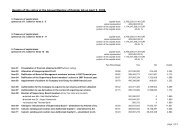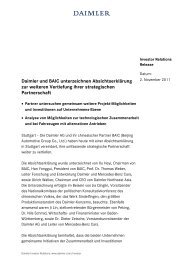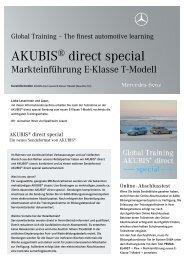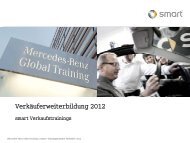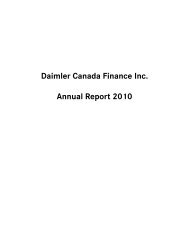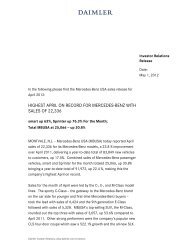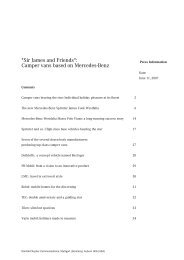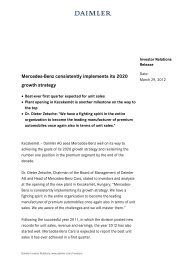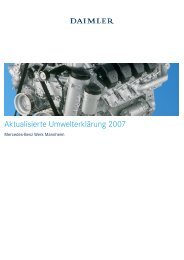Social Media Guidelines - Daimler
Social Media Guidelines - Daimler
Social Media Guidelines - Daimler
You also want an ePaper? Increase the reach of your titles
YUMPU automatically turns print PDFs into web optimized ePapers that Google loves.
<strong>Social</strong> <strong>Media</strong> <strong>Guidelines</strong><br />
1<br />
July 2012<br />
It is no longer possible to imagine our society without the Internet. At present, the use of social media<br />
sites is gaining in significance. The term “social media” refers to platforms and networks, which pro-<br />
vide users with the opportunity to exchange photos, videos, opinions or even reviews and reports of<br />
their experiences. Among others, these include blogs, Wikipedia, YouTube, Facebook and Twitter.<br />
The growing popularity of social media is highly significant for companies as well. Users talk about<br />
companies online, discuss new technologies and recommend or do not recommend products. Anyone<br />
who ignores these discussion platforms is also ignoring an extremely effective communications chan-<br />
nel. <strong>Social</strong> media involvement can provide support in the early identification of new trends, responding<br />
to criticism or advancing one's own topics. And who can represent the company and its diversity to<br />
the public better than its employees? With your expert knowledge, you can enrich discussions on the<br />
Internet or find useful suggestions for your work.<br />
It is therefore in <strong>Daimler</strong>'s interest to encourage involvement in the area of social media. However, it<br />
is always worth noting that there are still many areas of uncertainty regarding the use of these forms<br />
of communication. The following notes have been compiled to inform you of the opportunities and<br />
risks of professional use. Unless they relate to legally required matters, these notes are not to be<br />
viewed as orders, but rather as recommendations intended to help you in your use of social media.
Ten tips for dealing with social media<br />
2<br />
July 2012<br />
1. It’s always about conversation. If you use social media as a one-way communication tool, you<br />
will soon find yourself talking to a brick wall. Only those who actively seek conversation, partici-<br />
pate in discussions and reply to questions are taken seriously on the web.<br />
2. Pay attention to quality. It is easy to get a lot of attention quickly on the Internet. However, sus-<br />
tained, intensive dialog is valuable only if initiated or enriched by high-quality content.<br />
3. Be honest. The truth will come out, especially on the Internet. Information can be verified imme-<br />
diately on the web. False statements or even omissions are exposed immediately. Disclose your<br />
sources. This shows respect for the author and increases your credibility.<br />
4. Remain polite. A dialog is only worthwhile if all participants treat each other with respect. Avoid<br />
provoking and insulting people and break off conversations if your partner becomes offensive.<br />
5. Correct your own mistakes. Many web users are quick to anger, but also quick to forgive. Admit<br />
to your own mistakes and correct them. It is recommended that these changes be made quickly<br />
and clearly in order to avoid misunderstandings or irritation. If you point out errors in articles or<br />
comments concerning your field of work, do so factually and politely.<br />
6. Be professional, even as a private individual. Even if you use social media "only" in a private<br />
capacity, you may encounter business contacts or encounter questions about your job. In such<br />
cases it is in your best interest not to allow embarrassment through private details. Once some-<br />
thing is published, it can rarely be removed completely from the Internet. By simply searching and<br />
linking events, it is possible to draw conclusions concerning personal relationships, professional<br />
responsibilities or opinions on certain topics.<br />
7. Separate opinions from fact. To avoid misunderstandings, you should make a clear distinction<br />
between opinions and facts in your statements. You should also indicate whether you are present-<br />
ing your own opinion or that of the company.<br />
8. Be yourself. Trust and credibility are the pillars of social networks. Do not put on an act, but al-<br />
ways show who you are and what you are. Open online communication requires you to be honest<br />
about your background. If you are active on behalf of <strong>Daimler</strong> on the Internet or represent Daim-<br />
ler's interests, own up to it! For instance, you can ensure transparency by means of a disclaimer<br />
attached to your comments. Example: I am an employee of <strong>Daimler</strong> and the opinions presented he-<br />
re are my own.<br />
9. Handle confidential information confidentially. Take care when dealing with company informa-<br />
tion. You may not pass on confidential information received by you as part of your job. If you are<br />
unsure whether you are allowed to publish certain information, ask your supervisor, your Informa-<br />
tion Security Officer (ISO) or Corporate Communications. If in doubt, do not publish. Also observe
3<br />
July 2012<br />
data protection regulations. Do not publish information about third parties without having dis-<br />
cussed it in advance with the persons concerned.<br />
10. Observe the law. Do not publish slanderous, libellous or otherwise illegal content. Do not publish<br />
content on the Internet without copyright information, always comply with other copyrights and<br />
respect individuals' rights to their own image. Maintain confidentiality on company information<br />
that could affect the share price of <strong>Daimler</strong> securities. If you have access to information that is<br />
not publicly known, you must not recommend to anyone to buy or sell <strong>Daimler</strong> securities or oth-<br />
erwise prompt other persons to do so.<br />
Your employment agreement, the Integrity Code and the Information Policy provide a binding frame-<br />
work for ensuring compliance with the applicable legal regulations in your own interests and the inter-<br />
ests of <strong>Daimler</strong> AG. This applies in particular to the treatment of confidential company and personal<br />
information (see point 5) and to all forms of conduct that could expose you to a conflict of interests.<br />
Jörg Howe<br />
Head of Global Communications, <strong>Daimler</strong> AG



